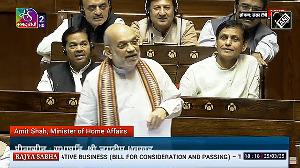Rajiv Shukla, vice president of the Board of Control for Cricket in India, told rediff.com that whatever is needed to be done to keep up the BCCI's reputation will be done. He said, "BCCI has a reputation to keep and it cannot be maligned under any circumstance."
It seems that a majority of the BCCI's governing body are in agreement with Shukla's views.
A senior functionary from India's cricketing world told rediff.com, "We have an overwhelming majority within the BCCI who wants Lalit Modi to resign. I repeat, an overwhelming majority within BCCI wants Modi to go because of the corruption charges that have come to light recently."
He said, "There is enough proof of arm-twisting done of investors by Modi in the case of IPL Kochi."
He said BCCI chief Shashank Manohar had to intervene in early April to support IPL Kochi's case, and warned Modi to not "arm-twist" its investors.
BCCI sources said on April 9, Lalit Modi handed over the registration letter to IPL Kochi's investors following pressure from Manohar. He was quite angry on that day on being forced to issue the letter ratifying the bidding for IPL Kochi.
Modi has, reportedly, threatened IPL Kochi investors that "we will not allow IPL Kochi to run smoothly."
All these allegations are not proven yet, and will be placed before the BCCI's governing body on April 26 and Modi's defence sought. Modi's game plan was to either have control of IPL Kochi or scuttle it.
While explaining Shashi Tharoor's resignation as minister of state following the controversy over the sweat equity given to his good friend Sunanda Pushkar, a BCCI member said this was on expected lines as his friend did receive free equity. The BCCI member also recalled that P Chidambram had to resign in 1992 when it was found that his wife Nalini had invested in the scam-tainted Fairgrowth Financial Services which was linked to scam-tainted broker Harshad Mehta. He was later absolved of the charges with the help of Arun Jaitley, who fought his case in court.
Asked about IPL team owners like Vijay Mallya and Shilpa Shetty strongly supporting Lalit Modi, the BCCI insider said, "Mallya has no idea how things are run in public life. They are a bunch of political novices who know how to run a business. In cricket, which is a mass-based industry, credibility matters and not clever business sense."
He says, "It is important to note that in the last many decades the BCCI has not tolerated such allegations against any of its members for long."
Given all the above, the top barons of BCCI will decide on April 26 if Modi's usefulness for IPL is over or not.
The Congress party and the central government have given their opinion unequivocally on the matter: Modi should go, period.
The hottest episode in the unfolding IPL saga underscores a curious seesaw battle. Who is more lethal in a globalising India? Is it still State power vested in the ruling party? Or is it the "market forces" that is wielded by corporate India in the form of the lengthening shadow of the country's billionaires? That is the big question.
In many ways, the struggle between Lalit Modi and India's State power is a litmus test for the locus of real power in the country.









 © 2025
© 2025